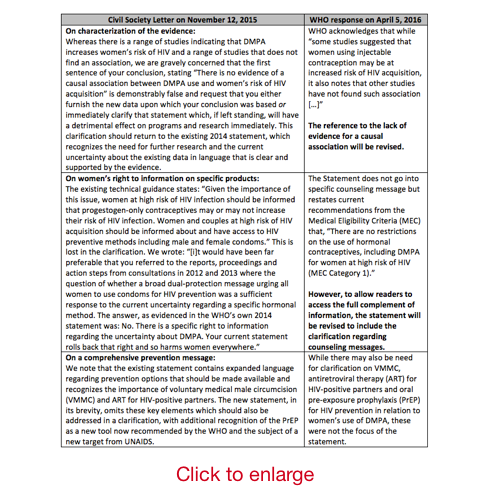April 5, 2016
A nearly five-month long waiting game for a response from the World Health Organization (WHO) regarding advocates’ concerns about its confusing and inaccurate statement on the relationship between some forms of hormonal contraception and HIV ended on April 5. Sadly, the response starts a new waiting game, since the long-awaited letter promised action on some, though not all, of the points raised in the original letter (sent November 12, 2015), with no timeline or process described for taking that action. (Wheels may be turning, as the link to the October 2015 statement no longer goes to the full statement.)
By way of background, in October 2015, the WHO, without warning, posted a new statement on hormonal contraception and HIV on its website. The statement claimed to be a clarification of the existing, expert-reviewed guidance on the topic. However, it contained a range of inaccurate and confusing statements that contradicted or muddied the clarity of the statement it sought to simplify.
On November 12, 2015 an international coalition of organizations wrote an urgent letter to the WHO requesting immediate action on the statement. Citing the confusion that the new statement caused in terms of the mixed evidence showing that DMPA, aka Depo-Provera, impacts women’s risk of HIV, advocates asked for the statement to be taken down so that the existing note would continue to be the main point of reference for the field. The letter was sent by the International Community of Women Living with HIV Eastern Africa (ICWEA), co-convener of a civil society working group on contraception and HIV, and AVAC. (You can read the original sign-on letter here, and see a table below that outlines the requests in that letter with the WHO response).
The letter wasn’t officially acknowledged until some months later, when ICWEA wrote requesting an update. And the response did not come in until April 5. In summary, WHO agreed to:
(1) revise the statement to correctly characterize the evidence;
(2) revise the statement to specifically reference women’s right to know about the uncertainty regarding DMPA and HIV risk.
WHO stated that it will not add reference to additional prevention methods beyond male and female condoms, even though the technical guidance refers to a range of methods. This is particularly disappointing given WHO’s strong recommendation in September for the offer of oral PrEP for “all people at substantial risk of infection”.
ICWEA and AVAC will work with partners who signed on to the original response to develop a response in the coming days. Please be in touch with ideas and reactions.
Below is what we asked for and what WHO said, in detail:
